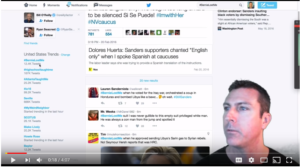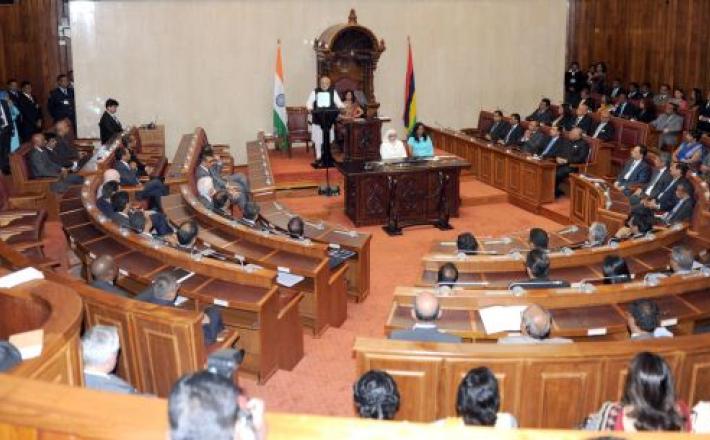Abstract
This paper consists of how social media are encouraging women to participate in politics nowadays in a country like Mauritius. The first point that will be analysed is what the author Bihel argued on how women has adopted the concept of participatory culture online in order to build a community which will enable them to make their campaign. Another important point that will be discussed in this paper is to show how women were portrayed before and to what extent our society meaning Mauritians society has now changed their perceptions on women. For example, long ago people were living with the kind of perceptions that Maria Zachs mentioned in her theory that women are considered as minority in today’s political society following the rule that the minority group is always inferior to the majority one. Now with the evolution of the internet,this hierarchical societal structure is disappearing to some extent.Many other theorists did agree with the fact that the internet nowadays is breaking these barriers and is allowing female politicians to express themselves , create their identity online and their interactions with the society. This paper’s main focus will be on the extent to which social media contribute to encourage women to participate in politics in Mauritius and to understand the influences that social networks have on both politicians and the society.
Introduction
Social Media is the collective of online communication channels related to community-based input, interaction, content- sharing and collaboration. Websites and applications dedicated to forums, microblogging, social networking and so on ( Mascheroni et al. ,2015). These are online platforms where people are able to create their virtual identity which can be very different from the person’s real identity ( Mascheroni et al., 2015). Long ago, women were forbidden from the law to participate in politics because they were considered as uneducated and ‘inferior’ to the society. As the Turkish female politician Muhiddin claimed in order for women to assert their rightful places in social and political life “ we need to raise awareness then we need to educate” (Guler, 2014). Nowadays women in politics has in a certain way got that equal rights but, are they really equal to men in the parliamentary or is it a myth? Basically now women have dual burden meaning that they have more than one responsibilities- home and work. Also, now they can be part in the parliamentary if ever they have knowledge in politics especially in a developing country like Mauritius which is well-known for its diversity of culture. What have encouraged them to participate in politics is the fact of being able to talk and share opinions online ( Yarchi et al., 2018). Indeed, according to Bihel et al. these platforms have helped in breaking these barriers and stereotypes being put on them as a ‘woman’. But since now, have social media really helped in breaking these barriers and stereotypes put on female politicians?
Since 2012, Mauritius has passed under a law which was implemented by the local government to state that at least one third of the candidates who run the local elections have to be of a different gender (Bihel et al., 2016). Basically this statement made by the author Zachs, has clearly mentioned that even women have now the right to participate in politics but they are still considered as the ‘minority’ since it must be at least ‘one third’ which mean that women would not be the majority one to control the parliamentary. For example, during the fight of the Turkish female politician Muhiddin to allow women to participate in politics in 1940s, only five percent of women were allowed to access the Parliament (Guler, 2014). Whereas since the existence of the social media, women are now able to create themselves an online identity and make them known by the public. Meanwhile, female politicians seized this opportunity to make campaigns online ( Eckert, 2014). For example during the presidential election in US, one of the female candidate, Mrs Hillary Clinton has paid Twitter to inject Hashtag as top trend. Why has she done this? It’s because she knows very well the importance of getting a hashtag in her name so that the media can cover the fact that she is the ‘favorite’ and that she’s going to win the election which is considered as a constructed fact ( Yarchi et al.,2018). Likely, here in Mauritius a recent by-election has taken place at the region of Quatre-Bornes. Tania Diolle a female candidate from the party ‘ Mouvement Patriotique’ has used Facebook to make her campaign. In her videos she is portraying herself as the ‘perfect elite’ that could represent this region in the Parliament. She is creating both an identity and a community on the social networks through her videos, photos, etc (Bihel et al.,2016). But are everything that she is being portrayed online are true?

Hashtags portraying Hillary Clinton as the top trend.
Moreover, according to Bihel et al. Mauritius is considered as a role model of Africa by being the first stable democracy in the Southern African Development Community (SADC). This paradise island has also broken a big barrier by giving the title of first female president in Africa to Mrs Ameena Gurib Fakim. Mauritius is considered as a rainbow nation due to its cultural diversity but even though our culture did not allow us to give such an opportunity to a woman as our culture still considered women as being ‘inferior’ so much like Guler mentioned in his theory on Turkish female politicians that “the representation of women in political and decision-making bodies has been relatively low”. Even of having a female President or a Prime Minister, the majority will always be men in the Parliament. While the ex Prime Minister Sir Aneerood Jugnauth has announced the nomination of Mrs Fakim, many were not agreed with the fact to be directed by a female President because she was a ‘woman’ and for Mauritian culture women are ‘incompetent’ and cannot ‘be good enough to manage the post of a president’ ( Bihel et al., 2016). But on social media such as Facebook there were lots of online posts from women, girls even men who wanted her as president in order to eliminate these stereotypes put on Mauritian women. People already knew that Mrs Ameena Gurib Fakim is an educated women and a well- known science lecturer at the University of Mauritius where those youngsters from this particular institution were giving their full support by giving good feedbacks on her as a lecturer. However, there were also those posting ‘sexists’ comments on her. As the author Eckert et al. claimed “women will tap into the haphazard democratic potential of social media”. Also, the local government has voted to get a female speaker who is Maya Hanoomanjee well known for her favorite sentence “ I order you out”. Many have created funny YouTube videos to mock the way she managed the parliamentary. But even though she is the one controlling the parliament where the majority are men. This represent an increase in political representation of women presenting a hopeful picture (Guler, 2014). However, tags of being a ‘funny’ speaker have been put on her because once again she is a ‘woman’. So much of sarcastic videos have never been made on the Speaker before. But still, even if social media is used to make these female politicians to lose their identity online, they persevere in proving that they can be much more competent than male when it concerns politics (Mascheroni et al., 2015).
Furthermore, long ago there existed many places which were called the public sphere where people were united to talk about politics issues, doing some protests and so on (Yarchi et al.,2018).“By the ‘public sphere’ we mean first of all a realm of our social life in which something approaching public opinion can be formed…” (Eckert et al.,2014). Women, in fact had not the right to participate in these spheres because during this era, the place of women were at home ( Eckert et al., 2014). So only men have got the right to participate in these type of discussions. Nowadays with the evolution of the Web 2.0 which have enable people to create a community online in order to share a specific point of view, giving their opinions or liking their favorite political figure or party (Eckert et al., 2014). This has become the new public sphere where people even women are now able to participate by commenting, sharing posts, writing statuses, blogging and so on. As the author Yarchi et al. claimed “social media could provide a more supportive environment for women compared to men as women are much more likely than men to respond to public messages and to like contents” (Yarchi et al., 2018). Also, in Mauritius there is a lot of women who have complete interest with politics (Yarchi et al.,2018). The new media have allowed this particular group to show their interest to political issues happening such as in 2010 during the election campaign Navin Ramgoolam the leader of the labour party has insulted a female candidate from his own party called Nita Deerpalsingh. He insulted her live on the radio. This has created a chaos where the population itself were so furious against a person that they were going to vote and who were supposed to represent the role model of the society and maybe that could be the reason why this party had lost the election at that time. It is a way to show how women in politics are treated in this party. So, people especially women did not want to get such a Prime Minister to lead the country. Social media such as Facebook had burst out with comments and posts which have pushed the leader of the labour party to apologise in front of the whole population in order to regain the trust of the population. This to show the extent of power that social media which is considered as the public sphere has onto a country nowadays (Bihel et al.,2016).
Nevertheless, social media does not always encourage women to participate in politics as it is a platform that can destroy your reputation as a public figure as well (Mascheroni et al., 2015).It is a platform where women can create an identity so that people can trust them (Mascheroni et al., 2015). So, in other words when you are a female politician you have to know how to keep your image high and how to encourage people to follow you on social media. It’s by proposing new and interesting subjects. For example Mrs Nandanee Sournack, who was a well-known business woman in Mauritius have had an affair with the leader of the labour party Mr Navin Ramgoolam who was the actual Prime Minister at that time. They were both attending a private party when the local media has taken a photo of them dancing and enjoying together. It was a ‘private party’ since she was with the Prime Minister, this has become a media coverage issue because he was not with his wife. Since that day, Mrs Nandanee Sournack has been victim of lots of insults because for the society she was the one who was the culprit because she was supposed to control herself as she is the ‘woman’. People have used social media to express themselves concerning this issue and this have affected her so much that she chose to leave Mauritius (Bihel et al., 2014). Also, according to Eckert et al. “blog is a space where they can add perspectives that have been neglected or are missing in established (news) media and societal debate” (Eckert et al. , 2014). Sometimes politicians tend to hide some kind of information which can be against them but bloggers reveal those kind of subjects online. It is through this that the public know what is really happening throughout their country. For example recently a deputy has promised a woman to give her a job only if she accepts to have an affair with him.
To conclude it can be said that social networks have contributed as a great plus in both the emancipation of women and to promote gender equality especially in developing countries such as Mauritius. Mauritius, a country very well known for its cultural diversity as mentioned above is a place where people still considered women as ‘inferior’. But still Mauritius has overcome these barriers to prove that equality exists. It’s by giving the opportunity to women to integrate the Parliament which have in a way encouraging other women to move forward as they know that they have the support of these female politicians. Social media has encouraged women more in the sense that they are able to participate and to form part in any kind of topics and these platforms have made them realised that they are supported by lots of associations, feminists and so on which made them more stronger and allow them to form part of these online communities.

